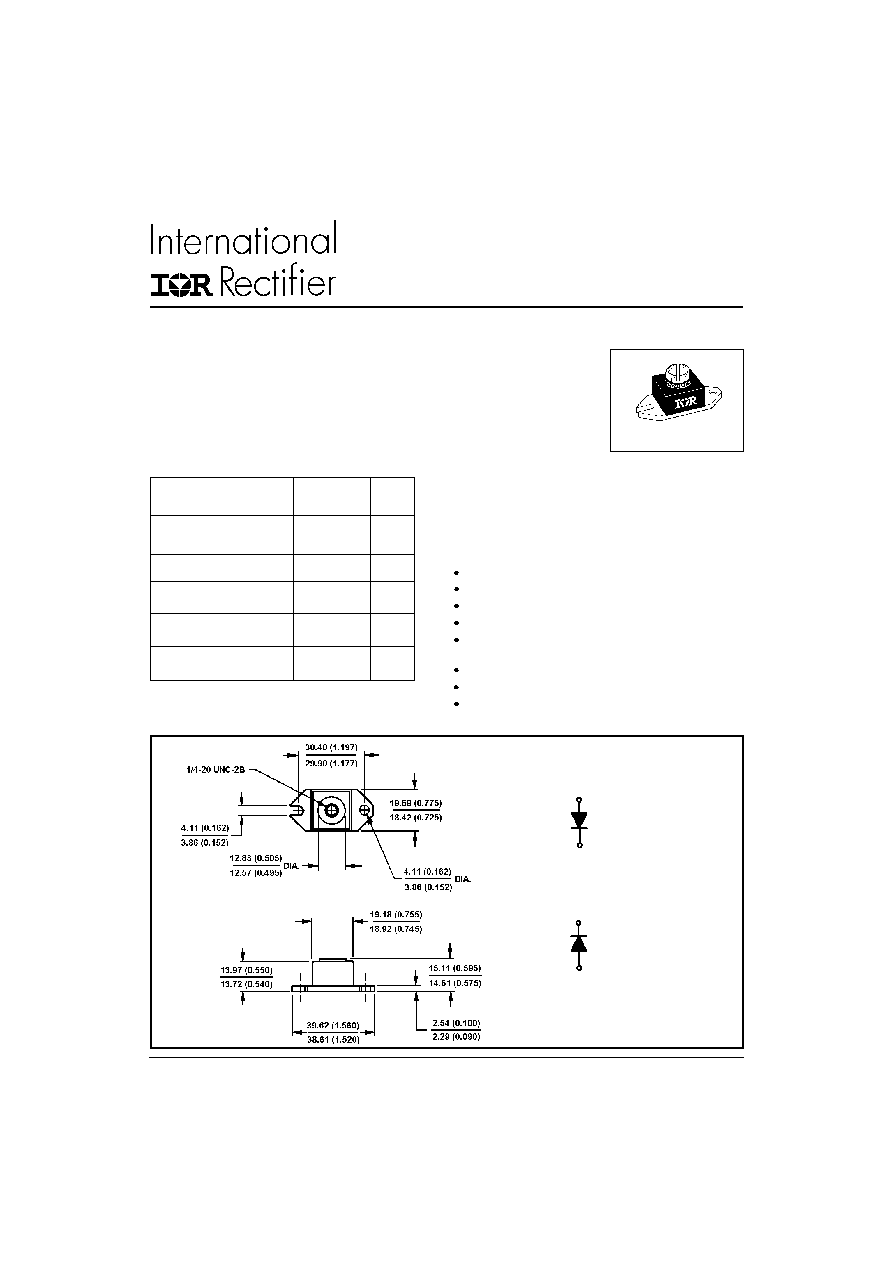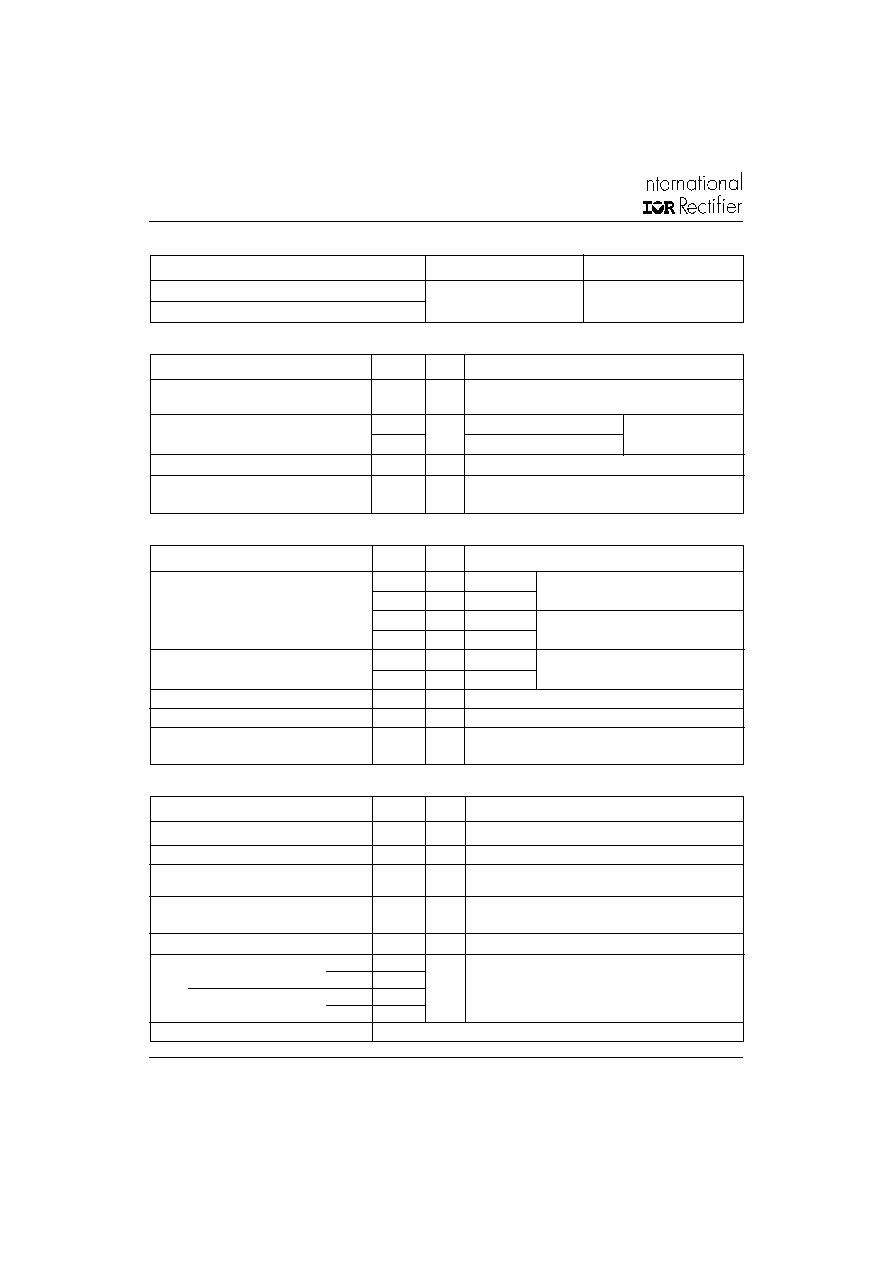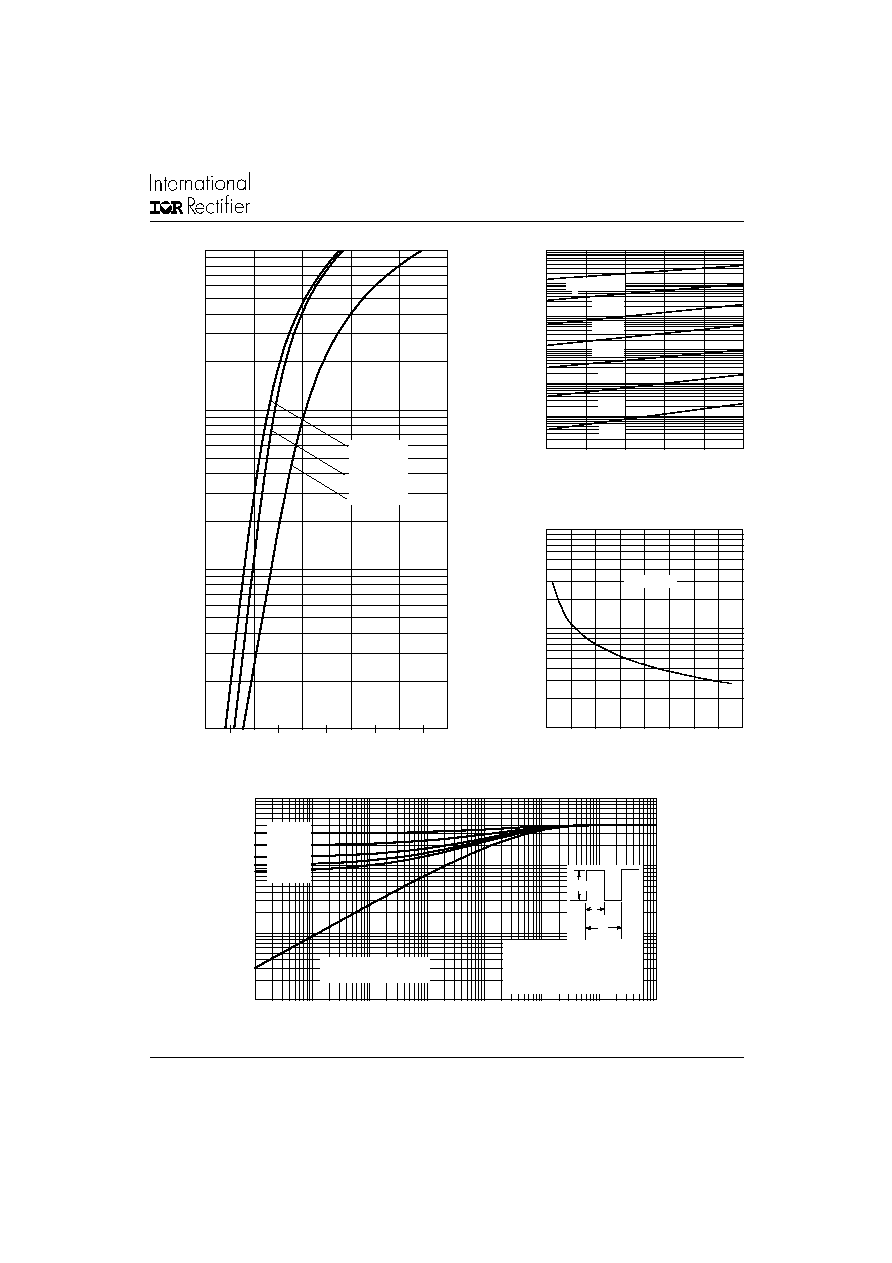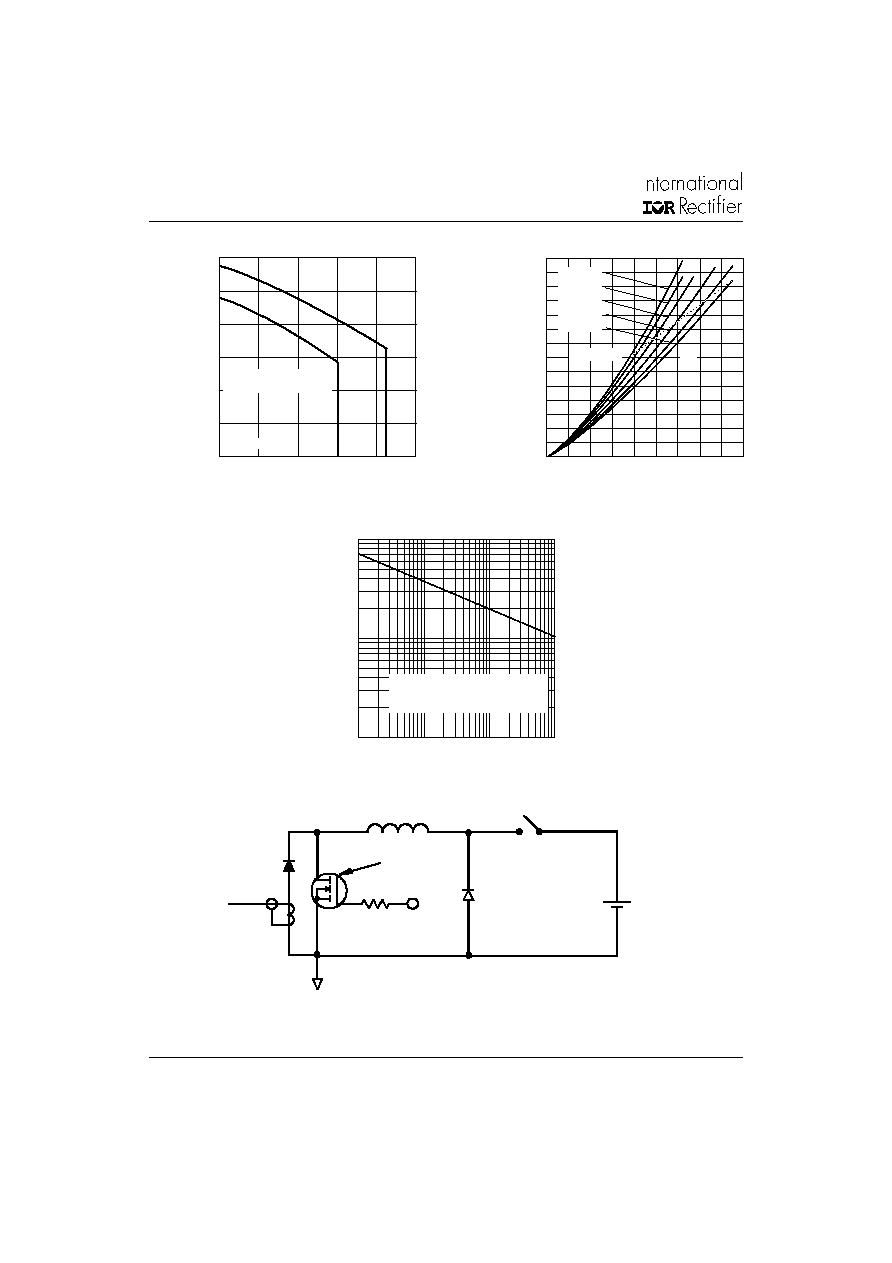 | –≠–ª–µ–∫—Ç—Ä–æ–Ω–Ω—ã–π –∫–æ–º–ø–æ–Ω–µ–Ω—Ç: 129NQ135 | –°–∫–∞—á–∞—Ç—å:  PDF PDF  ZIP ZIP |

Major Ratings and Characteristics
Description/Features
The 129NQ... (R) high current Schottky rectifier module series
has been optimized for low reverse leakage at high
temperature. The proprietary barrier technology allows for
reliable operation up to 175∞ C junction temperature. Typical
applications are in switching power supplies, converters, free-
wheeling diodes, and reverse battery protection.
175∞ C T
J
operation
Unique high power, Half-Pak module
Replaces two parallel DO-5's
Easier to mount and lower profile than DO-5's
High purity, high temperature epoxy encapsulation for
enhanced mechanical strength and moisture resistance
Low forward voltage drop
High frequency operation
Guard ring for enhanced ruggedness and long term
reliability
I
F(AV)
Rectangular
120
A
waveform
V
RRM
range
135 to 150
V
I
FSM
@ tp = 5 µs sine
10000
A
V
F
@
120Apk, T
J
=125∞C
0.74
V
T
J
range
- 55 to 175
∞C
Characteristics
129NQ...(R) Units
SCHOTTKY RECTIFIER
120 Amp
129NQ...(R) SERIES
1
www.irf.com
Bulletin PD-20719 rev. A 03/01
D-67
Outline D-67 HALF PAK Module
Dimensions in millimeters and (inches)
129NQ150
Lug Terminal Anode
Base Cathode
129NQ150R
Lug Terminal Cathode
Base Anode

129NQ...(R) Series
Bulletin PD-20719 rev. A 03/01
2
T
J
Max. Junction Temperature Range
-55 to 175
∞C
T
stg
Max. Storage Temperature Range
-55 to 175
∞C
R
thJC
Max. Thermal Resistance Junction
0.40
∞C/W
DC operation * See Fig. 4
to Case
R
thCS
Typical Thermal Resistance, Case to
0.15
∞C/W
Mounting surface , smooth and greased
Heatsink
wt
Approximate Weight
25.6 (0.9) g (oz.)
T
Mounting Torque
Min.
40 (35)
Non-lubricated threads
Max.
58 (50)
Terminal Torque
Min.
58 (50)
Max.
86 (75)
Case Style
HALF PAK Module
Thermal-Mechanical Specifications
Parameters
129NQ Units
Conditions
Kg-cm
(Ibf-in)
V
FM
Max. Forward Voltage Drop (1)
1.07
V
@ 120A
* See Fig. 1
1.27
V
@ 240A
0.74
V
@ 120A
0.86
V
@ 240A
I
RM
Max. Reverse Leakage Current (1)
3
mA
T
J
= 25 ∞C
* See Fig. 2
45
mA
T
J
= 125 ∞C
C
T
Max. Junction Capacitance
3000
pF
V
R
= 5V
DC
, (test signal range 100Khz to 1Mhz) 25 ∞C
L
S
Typical Series Inductance
7.0
nH
From top of terminal hole to mounting plane
dv/dt Max. Voltage Rate of Change
10,000
V/ µs
( Rated V
R
)
T
J
= 25 ∞C
T
J
= 125 ∞C
V
R
= rated V
R
Parameters
129NQ Units
Conditions
Electrical Specifications
I
F(AV)
Max. Average Forward Current
120
A
50% duty cycle @ T
C
= 117∞ C, rectangular wave form
* See Fig. 5
I
FSM
Max. Peak One Cycle Non-Repetitive
10000
5µs Sine or 3µs Rect. pulse
Surge Current * See Fig. 7
1200
10ms Sine or 6ms Rect. pulse
E
AS
Non-Repetitive Avalanche Energy
15
mJ
T
J
= 25 ∞C, I
AS
= 1 Amps, L = 30 mH
I
AR
Repetitive Avalanche Current
1
A
Current decaying linearly to zero in 1 µsec
Frequency limited by T
J
max. V
A
= 1.5 x V
R
typical
Parameters
129NQ Units
Conditions
Absolute Maximum Ratings
A
Part number
129NQ135
129NQ150
V
R
Max. DC Reverse Voltage (V)
V
RWM
Max. Working Peak Reverse Voltage (V)
Voltage Ratings
135
150
Following any rated
load condition and
with rated V
RRM
applied
(1) Pulse Width < 300µs, Duty Cycle < 2%

129NQ...(R) Series
Bulletin PD-20719 rev. A 03/01
3
Fig. 2 - Typical Values Of Reverse Current
Vs. Reverse Voltage
Fig. 1 - Max. Forward Voltage Drop Characteristics
Fig. 4 - Max. Thermal Impedance Z
thJC
Characteristics
Forward Voltage Drop - V
FM
(V)
Instantaneous Forward Current - I
F
(A)
Reverse Current - I
R
(mA)
Reverse Voltage - V
R
(V)
Reverse Voltage - V
R
(V)
Junction Capacitance - C
T
(pF)
t
1
, Rectangular Pulse Duration (Seconds)
Thermal Impedance Z
thJC
(∞C/W)
0.001
0.01
0.1
1
10
100
1000
0
30
60
90
120
150
150∞C
125∞C
100∞C
75∞C
50∞C
25∞C
T = 175∞C
J
100
1000
10000
0
40
80
120
160
T = 25∞C
J
0.001
0.01
0.1
1
0.00001
0.0001
0.001
0.01
0.1
1
10
100
Single Pulse
(Thermal Resistance)
D = 0.75
D = 0.50
D = 0.33
D = 0.25
D = 0.20
2
t
1
t
P
DM
Notes:
1. Duty factor D = t / t
2. Peak T = P x Z + T
J
DM
thJC
C
2
1
Fig. 3 - Typical Junction Capacitance
Vs. Reverse Voltage
1
10
100
1000
0
0.5
1
1.5
2
2.5
T = 175∞C
T = 125∞C
T = 25∞C
J
J
J

129NQ...(R) Series
Bulletin PD-20719 rev. A 03/01
4
Fig. 5 - Max. Allowable Case Temperature
Vs. Average Forward Current
Fig. 8 - Unclamped Inductive Test Circuit
Fig. 6 - Forward Power Loss Characteristics
FR EE-W HE EL
D IO D E
40H FL40S02
C UR RE N T
M O N ITO R
H IG H -SPE ED
SW ITC H
IRFP460
L
D UT
Rg = 25 ohm
V d = 25 V olt
+
(2) Formula used: T
C
= T
J
- (Pd + Pd
REV
) x R
thJC
;
Pd = Forward Power Loss = I
F(AV)
x V
FM
@ (I
F(AV)
/
D) (see Fig. 6);
Pd
REV
= Inverse Power Loss = V
R1
x I
R
(1 - D); I
R
@ V
R1
= rated V
R
Average Forward Current - I
F(AV)
(A)
Average Forward Current - I
F(AV)
(A)
Square Wave Pulse Duration - t
p
(microsec)
Fig. 7 - Max. Non-Repetitive Surge Current
Allowable Case Temperature (∞C)
Average Power Loss (Watts)
Non-Repetitive Surge Current - I
FSM (A)
100
1000
10000
10
100
1000
10000
At Any Rated Load Condition
And With Rated V Applied
Following Surge
RRM
0
20
40
60
80
100
120
140
0
20 40 60 80 100 120 140 160 180
DC
RMS Limit
D = 0.20
D = 0.25
D = 0.33
D = 0.50
D = 0.75
60
80
100
120
140
160
180
0
40
80
120
160
200
DC
see note (2)
Square wave (D = 0.50)
Rated V applied
R



